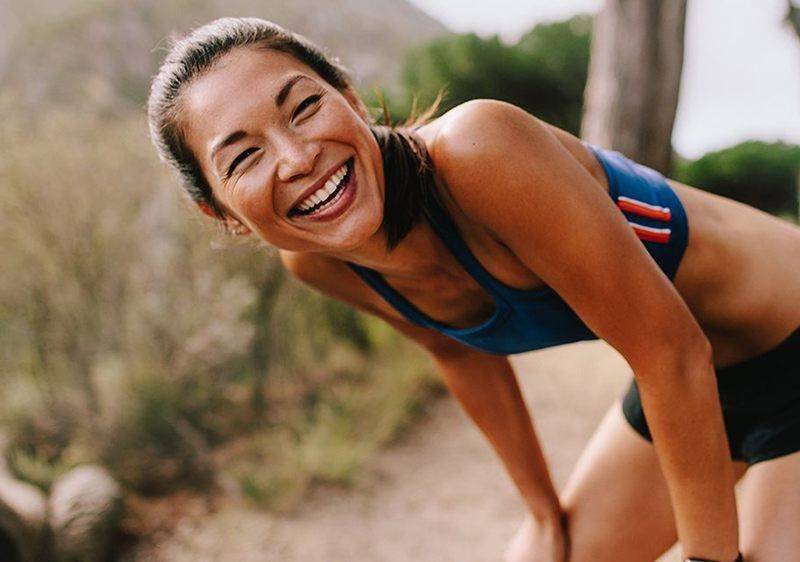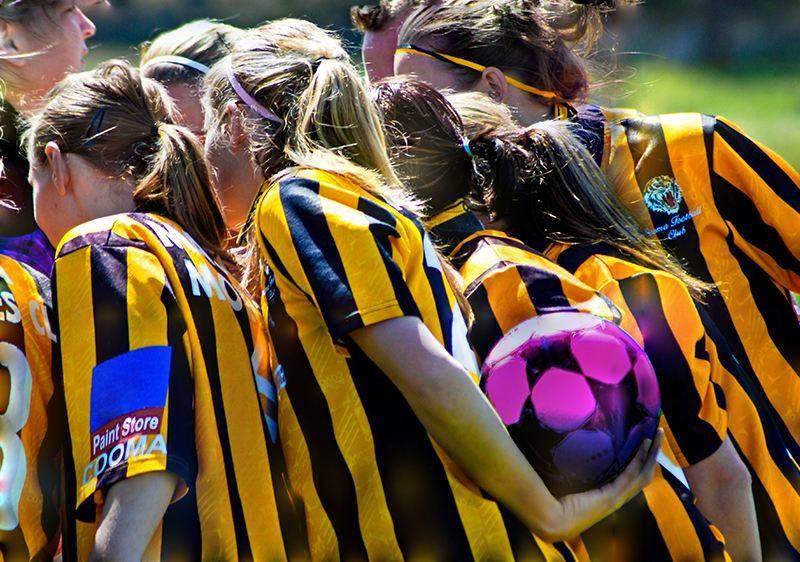Many Australians have a passion for sport, whether it’s playing footy or netball, skateboarding in a bowl, or cycling on a long, open road. There’s a thrill that appeals to sport lovers, but the spills can be devastating. Whether it’s a collision on the field, a tumble on a street or equipment failure – the risk of contact to the face and teeth is an ever-present danger. To minimise this risk, it’s a good idea to wear a mouthguard.
What is a mouthguard?
A mouthguard is a thick, often spongy shield that fits over your teeth. Mouthguards are usually worn during sports and other activities that involve a high risk of impact to the face.
They can be helpful outside of sports too. For instance, you might need to use a specialised mouthguard for jaw issues or teeth grinding. Dentists sometimes use special types of mouthguards to help treat snoring or sleep apnoea as well.
What are the risk factors when playing sport?
An injury can result in a loss of one or more teeth, broken or chipped teeth, jaw fractures or injuries to the soft tissue of the mouth. Dental trauma can also include damage to the gums and lips.
According to the Australian Dental Association (ADA), about one-third of traumatic injuries to teeth are sports-related. Sports Medicine Association Australia suggests that 50% of children experience some form of dental injury.
The good news is that injuries can often be prevented by using a custom-fitted mouthguard every time you play or train.
How can a mouthguard help?
When there’s direct impact to the lower part of your face, the force can travel through your jaw, teeth and even the upper part of your skull. This can increase the risk of injuries like front teeth fractures and even concussions. Blows to your lower jaw might cause the jaws to slam together and damage both rows of teeth.
Mouthguards act as a buffer for these kinds of impact. The spongy material helps to absorb the shock and lessen the force applied to your teeth, jaws or skull.
When to wear a mouthguard during sport
Mouthguards should be worn during games and training. Basically, it’s best to wear a mouthguard any time there’s a risk of impact to your face. Sports Medicine Australia and the Australian Dental Association recommend that regardless of whether the sport you play is considered a ‘contact sport’ or not, you’re encouraged to wear a mouthguard any time you’re on the field1.
Choosing the right mouthguard
There are two main mouthguard options on the market:
- Custom-fitted: Constructed and fitted by a dental professional, a customised mouthguard provides the best protection for your teeth. The dentist takes an impression of your teeth and makes a plaster model to get the closest possible fit. The mouthguard needs to be at least 4mm thick, with a cushioning effect that provides protection against impact. It fits snugly so it’s still possible to talk – an important aspect during an intense match.
- Boil-and-bite: Over-the-counter mouthguards that are self-fitted by immersing in hot water then biting into the mouthguard so it takes the shape of the teeth and mouth. It’s less effective and can be more uncomfortable as it doesn't conform as well to the person’s bite and anatomy of the jaw. However, if you're in a fix, a boil-and-bite mouthguard is better than no mouthguard at all.
Will a mouthguard affect my performance?
For custom-fitted mouthguards, the answer is no. Various studies have explored mouthguards’ effects on athletic performance. Most research points to there being no negative impact on strength or performance2,3.
However, some studies did report negative effects when wearing boil-and-bite mouthguards because of discomfort or breathing difficulties4. A poor fit is usually the culprit in these cases. This is another reason why it’s important to invest in a custom-made mouthguard.

How much do mouthguards cost?
Cost will come down to the type of mouthguard you choose. Boil-and-bite mouthguards can cost anywhere from $5 to $80.
Custom-fitted mouthguards are more costly, averaging around $190 – $300. A custom-fitted mouthguard is like a type of insurance – if a player doesn’t have protection but has a dental injury, dental and hospital costs are likely to exceed the cost (and time) of getting a custom-fitted mouthguard.
How to care for your mouthguard
After using a mouthguard, rinse it in soap and warm water, then allow it to air-dry. Also, use a mouthwash occasionally to disinfect it. When not in use, it should be kept in a cool place and stored in a plastic container with vents that allow air to circulate.
Most importantly, remember to bring it home after the game. If it’s left in the car, for example, the heat can destroy the shape, rendering it useless.
Mouthguards for kids
Many kids experience a dental injury when they’re playing sport3.
If your child isn’t keen on the idea of wearing a mouthguard, it can be helpful to point out sports idols who wear one. Most popular sports have star players who wear mouthguards. For example, LeBron James and other American NBA players are often spotted with their mouthguards.
Mouthguards can prevent dental injuries regardless of your age, so it’s important for athletes of all ages to consider.

Inspection time
Make sure your mouthguard is in good condition. To be certain, ask your dental professional to inspect it during a check-up. If it’s been damaged when playing, it may need to be replaced.
If the mouthguard is in tip-top condition and you don’t experience any major dental work such as restoration, it can last for quite a few years. When it comes to kids’ mouthguards, they need to be replaced every 12 to 18 months due to the child’s growth and any new teeth that alter the fit.
Remember, if a mouthguard starts to feel uncomfortable or doesn’t fit well, see your dentist for help.
Book your mouthguard consult today
If you can't find a suitable appointment online, please call the practice for assistance.
- Align Dental
- Bexley Dental
- Bupa Dental - Belmont
- Bupa Dental - Blacktown
- Bupa Dental - Bondi Junction
- Bupa Dental - Bowral
- Bupa Dental - Broadway
- Bupa Dental - Burwood
- Bupa Dental - Caringbah
- Bupa Dental - Castle Towers
- Bupa Dental - Chatswood
- Bupa Dental - Coffs Harbour
- Bupa Dental - Cremorne
- Bupa Dental - Erina
- Bupa Dental - Fairfield
- Bupa Dental - Five Dock
- Bupa Dental - Hornsby
- Bupa Dental - Hunters Hill
- Bupa Dental - Hurstville
- Bupa Dental - Kensington
- Bupa Dental - Lane Cove
- Bupa Dental - Liverpool
- Bupa Dental - Martin Place
- Bupa Dental - Mayfield
- Bupa Dental - Miranda
- Bupa Dental - Mortdale
- Bupa Dental - Narellan
- Bupa Dental - Newtown
- Bupa Dental - North Rocks
- Bupa Dental - Parramatta
- Bupa Dental - Penrith
- Bupa Dental - Rose Bay
- Bupa Dental - St Ives
- Bupa Dental - Warringah Mall
- Burwood Dental Centre & The Brightest Smile Spa
- Chatswood Dental Centre
- Clearly Dental - Dapto
- Clearly Dental - Riverwood
- Dulwich Dental Services
- Eastwood Dental
- Fresh Dental Care - Grafton
- Fresh Dental Care - Macksville
- Freshwater Dental
- Metro Dental - Menai
- Moorebank Dental
- Mosman 3D Dental
- Smile Line Dental Care
- Brisbane Dental Studio
- Bupa Dental - Albany Creek
- Bupa Dental - Brisbane
- Bupa Dental - Burleigh Heads
- Bupa Dental - Cairns
- Bupa Dental - Capri
- Bupa Dental - Carindale
- Bupa Dental - Cleveland
- Bupa Dental - Garden City
- Bupa Dental - Helensvale
- Bupa Dental - Kawana
- Bupa Dental - Maleny
- Bupa Dental - Paddington
- Bupa Dental - Paddington
- Bupa Dental - Pelican Waters
- Bupa Dental - Petrie
- Bupa Dental - Rochedale
- Bupa Dental - Tewantin
- Bupa Dental - The Gap
- Bupa Dental - Toowong
- Bupa Dental - Townsville
- Clearly Dental - Biloela
- Clearly Dental - Samford Village
- Dental on Bowen
- Face Value Dental
- Mary River Dental
- Moranbah Dental
- Robina Town Dental Centre
- Bupa Dental - Pascoe Vale
- Bupa Dental - Port Melbourne
- Bupa Dental - South Melbourne
- Bupa Dental - Werribee
- City Smiles Dental Clinic
- D-Spa - 538 Collins Street
- D-Spa - South Yarra
- Healthy Smiles Dental Group
- Robertson Dental Innovations - Condon St
- Robertson Dental Innovations - Sternberg St
- Rye Family Dental Care
Sources
1 Sports Medicine Australia. ‘No mouthguard no play,’ says Australia’s dentists and sports medicine specialists. [Online] 2015 [Accessed July 2015] Available from: www.sma.org.au
2 von Arx, Flury, Tschan et al. (2008). Exercise capacity in athletes with mouthguards. International Journal of Sports Medicine, 29(5): pp 435-438.
3 Duddy, Weissman, Paranjpe et al (2012). Influence of different types of mouthguards on strength and performance of collegiate athletes: a controlled-randomized trial. Dental Traumatology, 28(4): pp 263-267.
4 Cetin, Keçeci, Erdoğan et al (2009). Influence of custom-made mouth guards on strength, speed and anaerobic performance of taekwondo athletes. Dental Traumatology, 25(3): pp. 272-276.
Treatments
1 You can receive 100% back on dental check-up and cleans (select dental items only) once every 6 months at Members First Ultimate Providers. Waiting periods, benefit claiming restrictions, policy and fund rules apply. Excludes orthodontics and in-hospital treatments. Available on all eligible extras products which includes General Dental (excluding FLEXtras and Your Choice Extras 60 where General Dental is not included). If you choose or require any additional dental services, any health insurance benefits will also be subject to your yearly limits.
2 You can receive 100% back on direct restorations or fillings (select dental items only), up to yearly limits, at Members First Ultimate Providers. Waiting periods, benefit claiming restrictions, policy and fund rules apply. Benefits are payable up to yearly limits or on available remaining limits in relation to your product. Some out of pocket costs may apply if a claim exceeds your yearly limits. Excludes orthodontics and in-hospital treatments. Available on all eligible extras products which includes General Dental (excluding Simple Start – Basic Plus, OSHC Extras, FLEXtras and Your Choice Extras 60 where General Dental is not included). If you choose or require any additional dental services, an out-of-pocket cost may apply.
3 Members First Ultimate Providers are not available in all areas.
ø Any surgical or invasive procedure carries risks. Before proceeding, you should seek a second opinion from an appropriately qualified health practitioner.